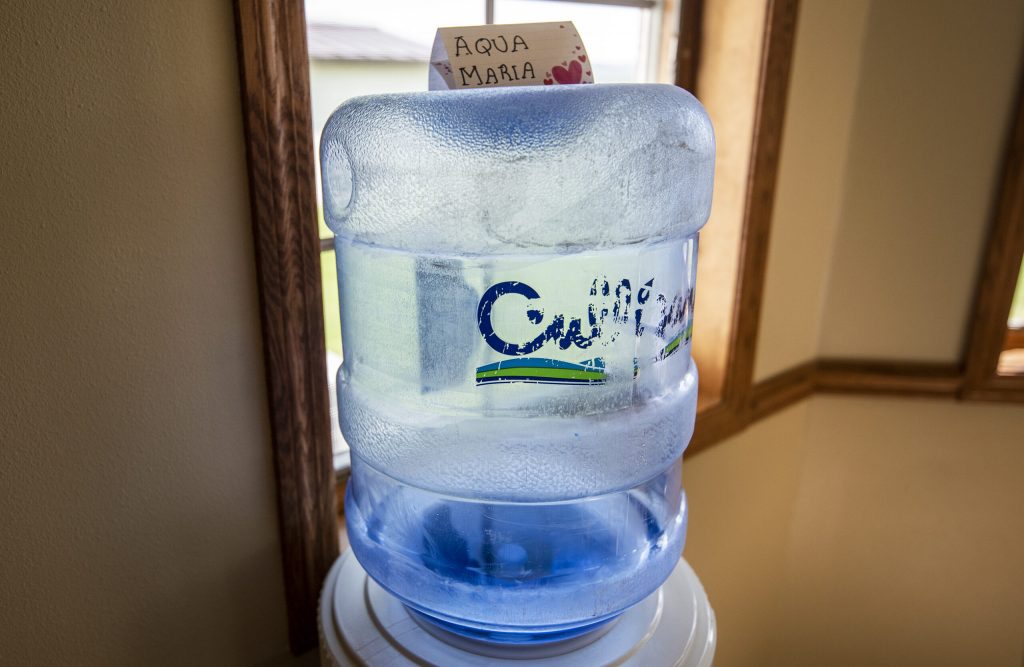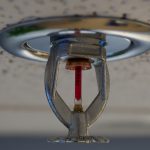PFAS Ban Wouldn’t Start Until 2028 Under New Bill
New legislation by western Wisconsin Democrats would ban products with added PFAS, offer alternative approach to spending state PFAS trust fund

Mary Wetterling named the water dispenser at her French Island, Wis., home “Aqua Maria.” Angela Major/WPR
Several Democratic state lawmakers want to ban the use of PFAS in most products starting in 2028.
But moving the legislation forward may be a challenge as GOP lawmakers and Democratic Gov. Tony Evers continue to be at odds over how to address the “forever chemicals.”
State Sen. Brad Pfaff, D-Onalaska, and state Rep. Jill Billings, D-La Crosse, announced a new bill that would prohibit the sale of certain products with added PFAS, like food packaging, cleaning products and cosmetics, starting in 2028. All products with PFAS would be banned in 2034, but the legislation would allow the state Department of Natural Resources to grant exemptions to products with unavoidable PFAS use.
During a press conference on Thursday, Pfaff said many national retailers have already committed to removing the group of synthetic chemicals, which have been linked to kidney and testicular cancers, fertility issues and other serious health problems.
He said cutting PFAS is no different from previous bans on products hurting public health and the environment. As an example, Pfaff pointed to the federal ban on DDT after it was found to be poisoning bald eagles.
“This nation stepped forward collectively and moved away from that product and we’ve got American bald eagles flying above us,” Pfaff said. “This nation moved away from leaded gasoline. We have unleaded gasoline, and we’re continuing to make transitions as we go forward.”
The legislation is similar to a ban created in Minnesota last year, which has been described as one of the broadest in the nation. Many products with added PFAS will start to be banned in 2025, with a full ban beginning in 2032.
Billings described it as an “aspirational bill,” saying she expects the timeline for phasing out PFAS could change as the legislation moves forward.
Western Wisconsin Democrats say new plan for PFAS grants offers clean slate after months-long debate
Pfaff and Billings announced the bill at the town hall in Campbell, a community on the Mississippi River where widespread PFAS contamination was first found in private wells at the end of 2020.
The two lawmakers also released what they described as an alternative proposal for using the $125 million PFAS trust fund created by lawmakers in the most recent state budget.
For months, lawmakers and Evers have argued over a plan by Republican senators Eric Wimberger and Rob Cowles to use the funding. The bill, which passed the state Legislature last week, creates grant programs for communities and landowners to address PFAS. The legislation also limits the authority of the DNR to test for and clean up PFAS.
Republicans say the restrictions are necessary to protect innocent landowners, including people who did not cause PFAS contamination found on their property or who unknowingly spread the substances through fertilizer and firefighting foam.
But Evers said in a letter to the co-chairs of the legislature’s Joint Finance Committee on Tuesday that the limitations on the DNR would let “polluters off the hook for cleaning up their contamination.” The governor said in the letter that he will veto the legislation, urging lawmakers to release the $125 million in funding to the DNR.
Billings said the new legislation announced on Thursday offers a clean slate to create PFAS programs.
“We need a vehicle that should be accessible for both sides to approach and agree upon, and I think that these bills get us there,” she said.
The legislation would also allow the DNR to move forward with creating a state standard for PFAS in groundwater. The agency was forced to halt progress in December because of a 2017 law that prevents agencies from working on regulations without legislative approval if the cost to implement them goes beyond $10 million in any two-year period.
Pfaff and Billings are already sponsors of another bill that would exempt DNR from these requirements. GOP lawmakers introduced their own bill last week that would allow the agency to move forward with developing a new standard without exempting it from the legislature’s final review.
Local leaders disagree on best approach to assistance
Despite Evers’ promise to veto Republicans’ plan, the Town of Peshtigo’s board passed a resolution on Wednesday urging the governor to sign the legislation. The resolution states the legislation will “provide much needed support to local governments and Wisconsin residents.”
The League of Wisconsin Municipalities, the Wisconsin Counties Association and the Wisconsin Towns Association also support the legislation, which they called “a compromise PFAS proposal.”
But some environmental groups and local leaders have maintained their opposition to the bill.
Margaret Larson, La Crosse County Board member who represents the Town of Campbell, said the community does not want to see the DNR lose any authority over potential polluters.
“That means that we’ll be valuing the dollars in the situation and not the human life, not the human factors,” she said. “What the DNR does is think about the health of people, critters, the environment, the water. And all of that is so important to us.”
Larson, who attended the press conference in support of the new legislation by Pfaff and Billings, said she is optimistic state lawmakers will consider the alternative proposal.
New bill would start banning products with PFAS in 2028 was originally published by Wisconsin Public Radio.
If you think stories like this are important, become a member of Urban Milwaukee and help support real, independent journalism. Plus you get some cool added benefits.





















